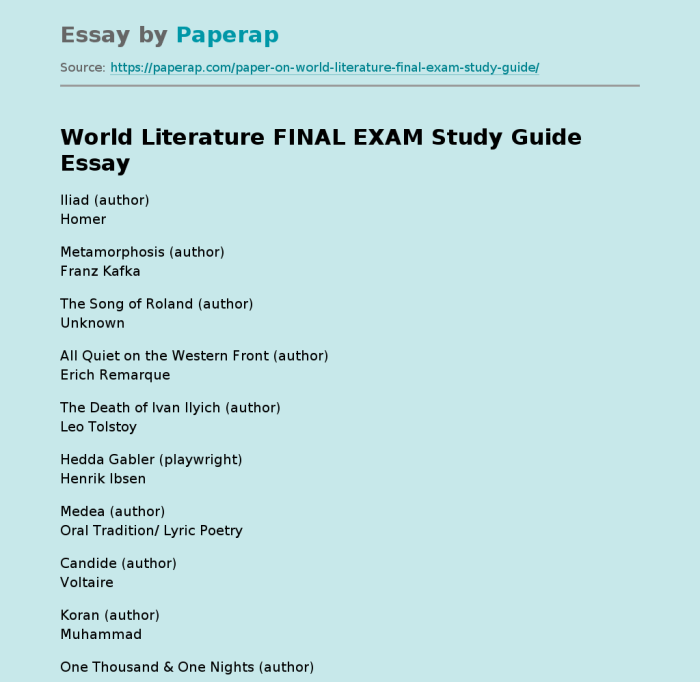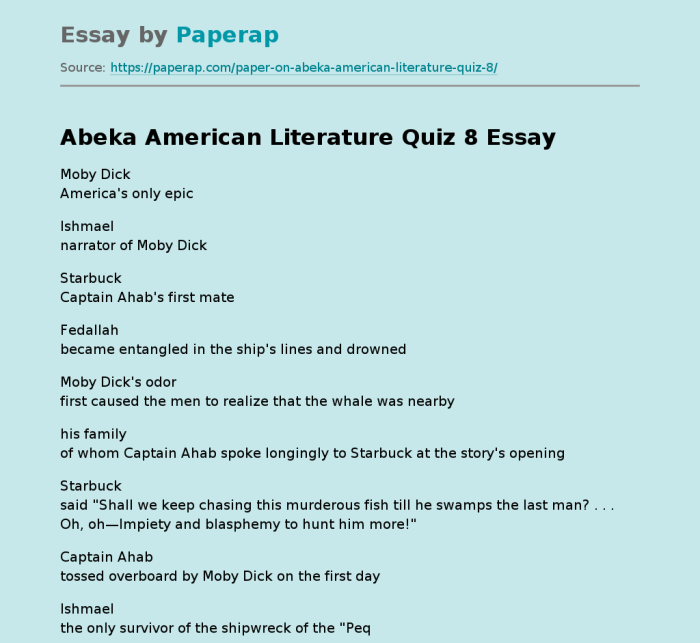Delve into the intricacies of American literature with the Abeka American Literature Test 6, a comprehensive assessment designed to evaluate your understanding of literary works, historical context, and critical analysis. This guide provides an in-depth overview, effective preparation strategies, and expert insights to empower you to excel in this exam.
Our comprehensive guide covers the essential elements of the test, including its purpose, structure, content, and target audience. We explore proven study methods, time management techniques, and test-taking strategies to maximize your performance. Additionally, we provide sample test questions with detailed explanations, helping you identify key concepts and avoid common pitfalls.
Abeka American Literature Test 6 Overview

The Abeka American Literature Test 6 is a comprehensive assessment tool designed to evaluate students’ knowledge and understanding of American literature from the Colonial era to the 21st century. It is typically administered to students in grades 10-12 who are enrolled in an American literature course.
The test consists of multiple-choice questions, short answer questions, and essay questions. The multiple-choice questions cover a wide range of topics, including literary terms, literary movements, and major authors and their works. The short answer questions require students to demonstrate their understanding of specific literary works, while the essay questions allow students to analyze and interpret literary texts in depth.
Target Audience
The Abeka American Literature Test 6 is primarily intended for students who are enrolled in an American literature course. It is also suitable for students who are preparing for the SAT or ACT college entrance exams, as it covers many of the same topics that are tested on those exams.
Test Preparation Strategies
Preparing for Abeka American Literature Test 6 requires a comprehensive approach that combines effective study methods, a thorough review of course materials, and strategic time management techniques.
Reviewing Course Materials
To effectively review course materials, consider the following strategies:
- Read the textbook thoroughly:Engage actively with the assigned textbook, highlighting key concepts and making annotations.
- Take notes during lectures and discussions:Summarize important points, ask questions, and clarify concepts to enhance understanding.
- Create study guides:Condense key information into concise summaries, diagrams, or flashcards for easy recall.
- Utilize online resources:Explore online platforms and databases for additional study materials, such as practice questions and video lectures.
Time Management and Test-Taking Techniques
Effective time management and test-taking techniques can significantly enhance performance:
- Create a study schedule:Allocate dedicated time for studying, reviewing, and practicing.
- Prioritize topics:Identify the most important concepts and allocate more time to their preparation.
- Practice active recall:Regularly test yourself on the material to improve retention and identify areas for improvement.
- Utilize time management strategies:During the test, manage time effectively by pacing yourself and allocating time wisely for each question.
Sample Test Questions and Analysis

Sample test questions and analysis are essential for preparing for the Abeka American Literature Test 6. They provide insights into the types of questions that may be encountered, common pitfalls, and effective test-taking strategies.
Multiple Choice Questions
Multiple choice questions test students’ knowledge of specific literary elements and concepts. They typically present several answer choices, only one of which is correct. For example:
- Which of the following is a characteristic of Romanticism?
- (A) Emphasis on reason and logic
- (B) Focus on the individual and imagination
- (C) Adherence to traditional forms
- (D) Rejection of the supernatural
Correct Answer: (B) Focus on the individual and imagination
Romanticism is known for its emphasis on the individual’s emotions, imagination, and connection with nature, not reason and logic.
Short Answer Questions
Short answer questions require students to provide brief, specific responses that demonstrate their understanding of literary concepts. For example:
- Explain the significance of the setting in Nathaniel Hawthorne’s “The Scarlet Letter.”
Correct Answer:
The setting of “The Scarlet Letter” in Puritan New England reflects the strict social and religious values of the time. It emphasizes the tension between the individual and society and the consequences of sin and judgment.
Essay Questions
Essay questions assess students’ ability to analyze and interpret literary works in depth. They require well-organized responses that support a central thesis statement. For example:
- Discuss the role of symbolism in Edgar Allan Poe’s “The Tell-Tale Heart.”
Correct Answer:
The symbolism in “The Tell-Tale Heart” enhances the story’s atmosphere of guilt and madness. The beating heart represents the narrator’s conscience, the old man’s eye symbolizes his watchful presence, and the vulture’s eye represents the narrator’s guilt and fear.
Literary Analysis and Interpretation: Abeka American Literature Test 6

Literary analysis and interpretation are essential skills for comprehending and appreciating literature. The Abeka American Literature Test 6 assesses students’ ability to analyze and interpret literary texts, including poetry, prose, and drama. This section of the exam requires students to demonstrate their understanding of literary devices, techniques, and themes.
Literary Devices and Techniques
Students should be familiar with a wide range of literary devices and techniques that authors use to create meaning and effect in their writing. Some of the most common devices tested on the exam include:
- Simile
- Metaphor
- Personification
- Symbolism
- Imagery
- Foreshadowing
- Irony
- Allusion
Students should be able to identify these devices and explain how they contribute to the meaning and impact of the text.
Analyzing Literary Texts
To analyze a literary text effectively, students should follow a systematic approach that includes:
- Close reading: Carefully examining the text to identify key details, themes, and literary devices.
- Contextualization: Understanding the historical, cultural, and biographical context in which the text was written.
- Interpretation: Forming a coherent and defensible interpretation of the text based on evidence from the text itself.
Students should be able to support their interpretations with specific examples from the text and demonstrate a deep understanding of the author’s intent and the text’s overall meaning.
Strong and Weak Literary Interpretations
Strong literary interpretations are characterized by the following qualities:
- They are based on evidence from the text.
- They are coherent and well-organized.
- They consider the author’s intent and the text’s context.
- They are supported by specific examples from the text.
Weak literary interpretations, on the other hand, may exhibit the following flaws:
- They are based on personal opinion or speculation.
- They are incoherent or disorganized.
- They ignore the author’s intent or the text’s context.
- They are not supported by evidence from the text.
By understanding the principles of literary analysis and interpretation, students can improve their ability to comprehend and appreciate literature and perform well on the Abeka American Literature Test 6.
Historical and Cultural Context
Understanding the historical and cultural context of American literature is crucial for literary analysis. It provides insights into the motivations, perspectives, and themes explored by authors. Historical events, social movements, and cultural norms shape the literature of a period, influencing its content, style, and interpretation.
Historical Events
- American Revolution (1775-1783):Inspired themes of liberty, independence, and self-determination, as seen in works like Thomas Paine’s “Common Sense” and the Declaration of Independence.
- Civil War (1861-1865):Explored issues of slavery, race, and the American identity, as reflected in works like Harriet Beecher Stowe’s “Uncle Tom’s Cabin” and Frederick Douglass’s “Narrative of the Life of Frederick Douglass, an American Slave.”
- Industrial Revolution (1800s-1900s):Led to urbanization, social change, and the rise of realism in literature, as depicted in works like Mark Twain’s “The Adventures of Huckleberry Finn” and Upton Sinclair’s “The Jungle.”
Test-Taking Tips and Strategies
Maximizing performance on the Abeka American Literature Test 6 requires effective test-taking strategies. This includes managing time wisely, pacing oneself appropriately, and maintaining accuracy. Additionally, developing techniques for handling challenging or unfamiliar questions can significantly enhance one’s performance.
Time Management and Pacing
- Before starting the test, allocate a specific amount of time to each section based on its weight and difficulty.
- Monitor the time remaining regularly and adjust pacing as needed.
- Avoid spending too much time on any single question; if necessary, move on and return later if time permits.
Accuracy, Abeka american literature test 6
- Read instructions carefully and ensure complete understanding before answering.
- Review answers thoroughly before submitting to minimize errors.
- Double-check responses for logical consistency and accuracy.
Handling Challenging Questions
- Identify the specific difficulty or area of confusion in the question.
- Break down complex questions into smaller, manageable parts.
- Utilize context clues and prior knowledge to make informed guesses when necessary.
Additional Tips
- Arrive well-rested and hydrated to enhance focus and concentration.
- Dress comfortably to minimize distractions.
- Utilize breaks wisely for short rest periods to refresh and refocus.
FAQ Summary
What is the purpose of the Abeka American Literature Test 6?
The test assesses students’ knowledge of American literature, literary devices, historical context, and critical analysis skills.
How should I prepare for the test?
Review course materials, identify key concepts, practice time management, and utilize effective study methods.
What types of questions are included on the test?
Multiple choice, short answer, and essay questions covering literary analysis, historical context, and critical interpretation.
